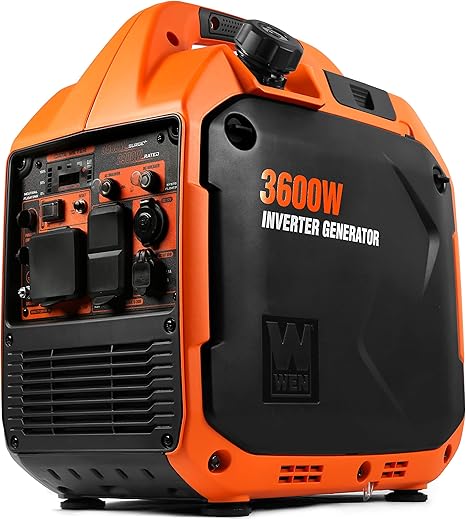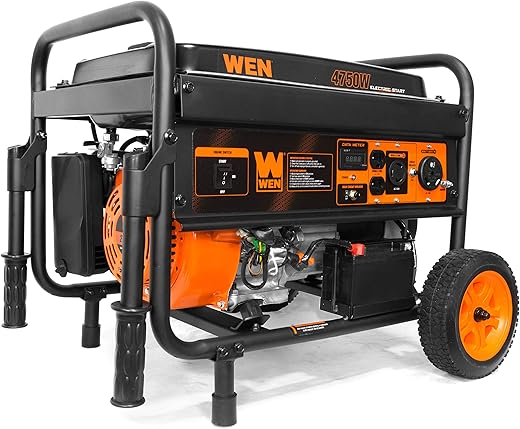As an avid RV enthusiast, I understand the thrill of hitting the open road and the challenges that come with it, especially when it comes to maintaining a reliable power source. Whether I’m enjoying a weekend getaway in the wilderness or embarking on a long road trip, the need for a dependable portable RV generator is paramount. In this blog post, I will delve into the essential features and considerations that make a portable RV generator the best choice for your unique power needs. Together, we’ll navigate the important factors to ensure your adventures are comfortable, convenient, and worry-free—because enjoying the journey should be at the forefront of every RV experience.
Understanding Your Power Needs
In the world of RVing, understanding your power needs is crucial for ensuring a smooth and enjoyable experience. Whether you’re relying on a generator during dry camping or hooking up to an electrical pedestal at a campsite, knowing how much power you require will help you plan effectively. Here, we will guide you through assessing your power requirements and cover various usage scenarios.
Assessing Your Power Requirements
Calculate Total Wattage Needed
The first step in evaluating your power needs is calculating the total wattage required for all your appliances, lights, and devices. This can be done easily by identifying each item’s power consumption, typically specified in watts. Here are the steps to follow:
- List Your Appliances: Create a comprehensive list of all devices you plan to use. This can include items like:
- Refrigerator: Dometic CFX 50W – 45 Watts (running)
- Microwave: Emerson MWG9115SB – 700 Watts
- Coffee Maker: Black+Decker DCM600B – 650 Watts
- LED Lights: (multiple) – approx. 5 Watts each
- Television: Vizio D-Series 32-Inch – 50 Watts
- Laptop: Dell XPS 13 – 65 Watts
- Determine Usage Duration: Estimate how many hours each device will be used daily. For example, if you plan to run your microwave for 15 minutes, multiply 700 Watts by 0.25 hours.
- Calculate Daily Consumption:[text{Daily Watt-Hours} = text{Power (W)} times text{Usage (hours)}]For example:
- Microwave: ( 700W times 0.25h = 175 Wh )
- Coffee Maker: ( 650W times 0.5h = 325 Wh )
- Summing Up: Add up the watt-hours from all devices to get your total daily wattage requirement.
Example Calculation
Let’s illustrate this with an example:
| Appliance | Power (W) | Hours Used | Daily Consumption (Wh) |
|---|---|---|---|
| Refrigerator | 45 | 24 | 1080 |
| Microwave | 700 | 0.25 | 175 |
| Coffee Maker | 650 | 0.5 | 325 |
| LED Lights (5x) | 5 | 5 | 125 |
| Television | 50 | 3 | 150 |
| Laptop | 65 | 4 | 260 |
| Total | 2115 Wh/day |
This total indicates that during a day of usage, you will need around 2,115 watt-hours (or 2.1 kWh) of energy.
Different Usage Scenarios
Dry Camping vs. Full Hookups
Understanding your power needs also varies significantly depending on your camping style. Below is a comparison of dry camping and full hookups:
| Feature | Dry Camping | Full Hookups |
|---|---|---|
| Power Source | Batteries, Generators | Shore Power (30/50 Amp) |
| Convenience | Limited power availability | Constant access to power |
| Flexibility | More adaptable locations | Tends to be more structured |
| Usage Power | Must manage wisely | Use freely with capacity |
Dry Camping
When dry camping, it’s crucial to manage your power wisely, as you’re likely reliant on batteries or a generator. Here are some tips:
- Invest in Quality Batteries: Consider high-capacity batteries like the Battle Born LiFePO4 100Ah, which allows for deep discharges without compromising battery life.
- Solar Panels: To supplement your battery power, you can invest in a solar setup, such as the Renogy 400 Watt 12 Volt Kit, which can continuously recharge your batteries during the day.
- Power Management Tools: Use devices like the Victron Energy Battery Monitor to track your consumption precisely.
Full Hookups
When you have access to shore power, the game changes. You can use all your appliances without concern for running out of battery. However, knowing your power requirements ensures you won’t accidentally overload the system.
- Power Distribution: Be mindful of your amp rating (30A vs. 50A) and invest in a surge protector like the Progressive Industries EMS-HW30C, which can protect your RV from spikes or faults.
- Continuous Usage: In full hookup scenarios, feel free to run high-wattage appliances like an air conditioner or electric heater, as long as you’re aware of your campground’s limits.
By following these guidelines, you’ll be able to accurately assess and manage your power needs while RVing, ensuring a more enjoyable and hassle-free experience on the road.
Types of Portable RV Generators
When it comes to powering up your RV on the go, choosing the right portable generator is essential. Not only do different types of generators serve specific purposes, but they also come with their own sets of benefits and drawbacks. In this section, we will explore the primary types of portable RV generators: inverter generators, conventional generators, and dual-fuel options. With practical examples and insights, you’ll be better equipped to select a generator that meets your needs.
Inverter Generators
Overview
Inverter generators are a popular choice for RV enthusiasts due to their compact size and efficient performance. They convert DC power to AC power, producing energy that is cleaner and quieter.
Benefits
- Quiet Operation: Inverter generators are significantly quieter than their conventional counterparts, making them ideal for camping and RV parks.
- Clean Power: They provide stable and clean power, which is safe for sensitive electronics like laptops and smartphones.
- Fuel Efficiency: These generators automatically adjust their engine speed to match the load, optimizing fuel consumption.
Drawbacks
- Higher Initial Cost: Inverter generators tend to be more expensive than conventional models.
- Limited Power Output: Generally, inverter generators offer lower wattage, which may not be sufficient for power-hungry appliances.
Best Use Cases
- Ideal for Camping: If you plan to camp in locations with strict noise regulations, an inverter generator is perfect.
- Powering Sensitive Electronics: Great for powering devices such as DVRs, computers, and TVs.
Popular Models
- Honda EU2200i:
- Weight: 47 lbs
- Output: 2200 watts
- Run Time: Up to 8.1 hours on a single tank
- Features: Quiet operation (48 dBA), parallel capability
- Yamaha EF2200iS:
- Weight: 55 lbs
- Output: 2200 watts
- Run Time: Up to 10.5 hours
- Features: Smart throttle, boosted inverter technology for cleaner power
| Feature | Honda EU2200i | Yamaha EF2200iS |
|---|---|---|
| Weight | 47 lbs | 55 lbs |
| Power Output | 2200 watts | 2200 watts |
| Noise Level | 48 dBA | 57 dBA |
| Fuel Tank Capacity | 0.95 gallons | 1.1 gallons |
Conventional Generators
Overview
Conventional generators are straightforward machines that use a traditional engine to produce electricity. They are often bulkier and louder but provide a higher power output for a lower initial investment.
Benefits
- Higher Wattage: Typically, these generators can produce more power than inverter generators, making them suitable for bigger RV appliances.
- Cost-Effective: They tend to come at a lower price point than inverter generators.
Drawbacks
- Loud Operation: Conventional generators are noisier, which may not be suitable for quiet camping environments.
- Lower Fuel Efficiency: These models often run at full throttle regardless of the power demand, leading to increased fuel consumption.
Best Use Cases
- Boondocking or Tailgating: Ideal for scenarios where higher power needs must be met without concern for noise restrictions.
- Home Backup: They can also serve as a reliable backup power source for homes during outages.
Popular Models
- Champion 3800-Watt Dual Fuel Generator:
- Weight: 105 lbs
- Output: 3800 watts (gas), 3400 watts (propane)
- Run Time: Up to 9 hours on gasoline
- Features: Dual fuel capability, electric start
- Westinghouse WGen7500:
- Weight: 192 lbs
- Output: 7500 watts
- Run Time: Up to 12 hours on a full tank
- Features: Remote start, 30A RV receptacle
| Feature | Champion 3800 | Westinghouse WGen7500 |
|---|---|---|
| Weight | 105 lbs | 192 lbs |
| Power Output | 3800 watts | 7500 watts |
| Noise Level | 58 dBA | 63 dBA |
| Run Time | Up to 9 hours | Up to 12 hours |
Dual-Fuel Generators
Overview
Dual-fuel generators offer the versatility to run on either gasoline or propane, providing greater flexibility depending on availability and preference.
Benefits
- Versatile Fuel Options: Running on either gasoline or propane allows users to select the most convenient fuel type.
- Longer Shelf Life for Propane: Propane can be stored longer than gasoline, making it a reliable option for emergency situations.
Drawbacks
- Increased Complexity: These generators can be more complex to operate and maintain due to dual-fuel mechanisms.
- Slightly Heavier: They may tend to be bulkier compared to single-fuel generators.
Best Use Cases
- Extended Travels: Great for long road trips where fuel availability may vary.
- Emergency Preparedness: A solid choice for homeowners wanting backup options.
Popular Models
- DuroMax XP12000EH:
- Weight: 129 lbs
- Output: 12000 watts
- Run Time: 8 hours on gasoline
- Features: 50 state approved, low oil shut off
- A-iPower SUA12000ED:
- Weight: 120 lbs
- Output: 12000 watts
- Run Time: 7 hours on gasoline
- Features: Electric start, steel frame for durability
| Feature | DuroMax XP12000EH | A-iPower SUA12000ED |
|---|---|---|
| Weight | 129 lbs | 120 lbs |
| Power Output | 12000 watts | 12000 watts |
| Run Time | 8 hours | 7 hours |
| Noise Level | 72 dBA | 68 dBA |
By understanding the unique advantages and disadvantages of these different types of portable RV generators, you can make an informed decision tailored to your specific RV lifestyle and needs. Each generator type has its own set of strengths, so consider your priorities regarding power output, noise levels, and budget when making your choice.
Key Features to Look For
Choosing the right portable RV generator can significantly enhance your camping experience. With a myriad of options available on the market, focusing on essential features will help you select a generator that suits your needs perfectly. Here, we outline the key features to consider, including fuel efficiency, noise level, portability, run time, starting watts vs. running watts, and safety features.
Fuel Efficiency
Fuel efficiency is a critical aspect when selecting a portable RV generator, particularly for prolonged trips away from the convenience of refill stations. The higher the fuel efficiency, the less frequently you’ll have to refuel, allowing for longer, uninterrupted usage.
Examples:
- Honda EU2200i: This generator boasts impressive fuel efficiency, capable of running for up to 8.1 hours on a single tank of gas at half load. Honda’s Eco-Throttle system adjusts the engine speed to the required load, further optimizing fuel consumption.
- Champion 2000-Watt Stackable Inverter Generator: Not only can this generator save fuel, but it’s also designed to run quietly, offering up to 11 hours of runtime on a 1-gallon tank.
Noise Level
Noise can be a significant concern, especially in quiet camping areas where you want to minimize disturbances. Portable RV generators vary in sound output, typically measured in decibels (dB).
Comparisons:
| Model | Noise Level (dBA) | Notable Features |
|---|---|---|
| Honda EU2200i | 48 | Super quiet at low load; Eco-Throttle |
| WEN 56200i | 51 | Lightweight design; parallel capability |
| Champion 2500-Watt | 58 | Fairly quiet for its power output |
Opting for models like the Honda EU2200i, which operates at an ultra-quiet 48 dB, allows you to enjoy peaceful evenings without the disruptive hum of a generator.
Portability
Portability is key when it comes to RV generators, as you’ll want a unit that is easy to transport, lift, and set up. Look for generators with lightweight designs, comfortable handles, and durable wheels.
Examples:
- Westinghouse iGen4500: Weighing only 93 pounds and featuring an ergonomic handle, the iGen4500 is easy to roll and store.
- Yamaha EF2200iS: This generator has a compact design and weighs around 55 pounds, with built-in wheels for enhanced mobility.
Run Time
It’s essential to consider the run time of a generator, which indicates how long it can operate on a full tank of fuel. A longer run time reduces the need for frequent refueling.
Considerations:
- Goal Zero Yeti 1500X: While technically a solar generator, it can provide hours of power without the noise and fumes associated with gas generators, making it a great option for longer stays.
- Generac iQ2000: This generator can run for up to 7.7 hours at half load, making it reliable for multiple uses throughout the day.
Starting Watts vs. Running Watts
Understanding the difference between starting (surge) watts and running watts is pivotal when choosing a generator. Starting watts indicate the amount of power required to start electric motors, while running watts refer to the continuous power needed.
Example:
- DuroMax XP2400i: Offers 2,400 starting watts and 1,900 running watts, which means it’s powerful enough to handle most RV appliances effectively.
When selecting a generator, ensure the starting watts can accommodate your most demanding appliances, such as air conditioners or microwaves.
Safety Features
Lastly, safety is paramount when selecting a generator. Look for models that include built-in features like low-oil shutdown, overload protection, and carbon monoxide (CO) detection to protect both the user and the generator.
Examples:
- Briggs & Stratton 30651: This generator includes an automatic voltage regulator, low-oil shutdown, and CO detection technology that can alert you to the dangers of CO buildup.
- Pulsar G450RN: Comes with overload protection and a low-oil shutoff feature, adding an extra layer of safety while in use.
Summary of Key Features
| Feature | Importance | Recommended Models |
|---|---|---|
| Fuel Efficiency | Reduces frequency of refueling | Honda EU2200i, Champion 2000 Watt |
| Noise Level | Minimizes disturbances at campsites | Honda EU2200i, WEN 56200i |
| Portability | Easy transportation & setup | Westinghouse iGen4500, Yamaha EF2200iS |
| Run Time | Longer usage periods without refueling | Goal Zero Yeti 1500X, Generac iQ2000 |
| Starting Watts vs. Running Watts | Ensures sufficient power for appliances | DuroMax XP2400i |
| Safety Features | Protects user and equipment | Briggs & Stratton 30651, Pulsar G450RN |
By focusing on these key features, you can ensure that your portable RV generator meets your specific needs, enhancing your overall experience while enjoying the great outdoors.
Key Takeaways and Final Recommendations
In conclusion, selecting the best portable RV generator for your power needs is a crucial step in enhancing your RV experience. Throughout this post, I’ve emphasized the importance of thoroughly understanding your personal power requirements, exploring the various types of generators available, and identifying essential features that cater to those needs. Based on these factors, I recommend considering models that balance efficiency, portability, and quiet operation. Ultimately, choosing a generator that aligns with your RV lifestyle will ensure you enjoy every adventure while staying powered up and comfortable. Happy travels!













Just bought the Champion 3100 and I love it! Highly recommend!
What about fuel efficiency? That’s super important for long trips!
Can you recommend a generator that’s quiet? I like to camp in peace.
What’s the warranty like on these generators? Do they last?
Great insights! I’ve been looking for a generator for my RV trips. Thanks!
I’ve had good luck with the Honda models. Anyone else have experience with them?
Looking for something lightweight. Any thoughts on that?
This was super helpful! I didn’t know there were so many options out there.
Are there any generators that are good for tailgating as well?